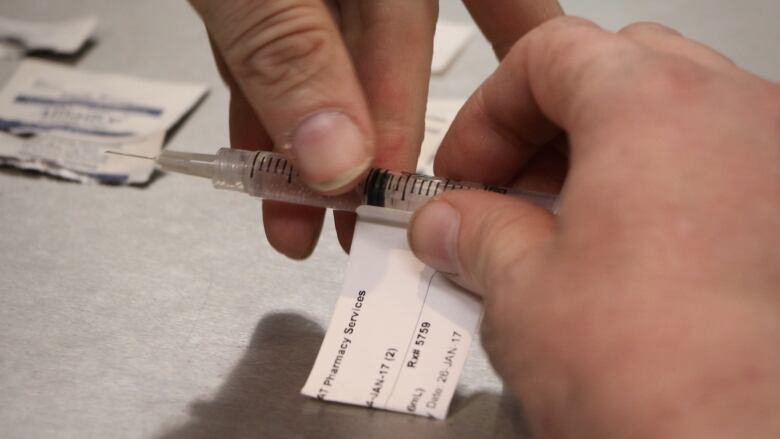Could prescription heroin help solve London's opioid crisis?
Health Minister suggests London, Ont. a good test city after success of pilot projects in Montreal, Vancouver

The Canadian government's research arm is weeks away from proposing a nation-wide trial that could involve giving prescription heroin to drug users, one way of fighting the country's growing opioid crisis.
London could be one of the sites where the treatment is tested because of this city's high injection drug-use rates.
That idea has the support of Chris Mackie, the Middlesex-London Health Unit'smedical officer of health, who met with Canada's health minister Thursday.
"There is evidence that injectable heroin works, and that it works better than other opioid maintenance therapy, and it should be more widely prescribed than it is now," Mackie told CBC News.
- Jane Philpott says pharmaceutical heroin a potential lifesaver
- London hands out 2.5M needles to addicts every year
Health Minister Jane Philpott was in London Thursday and met with health officials and politicians about the city's alarming drug problem.
She has previously said giving people with severe addictions prescriptions for heroin could save lives. A clinic in Vancouver is the only one in North America to prescribe heroin.
High rates of intravenous drug use in London
There are thought to be 6,000 injection drug users in London, as many as in Vancouver's Downtown Eastside. That's more than the number of injection drug users in Toronto and Montreal, Mackie said.
A recent survey of injection drug users in London found that almost 75 per cent inject drugs in public places and that 65 per cent do so daily.
"People are dying of overdose, people are dying of HIV and Hepatitis C. It's tragic, it's totally unnecessary, and we want to try to prevent that," Mackie said.
He explainedPhilpottsaid London would be the perfect site for a planned national study of treatment and harm reduction for opioidusers.
Study details to come within weeks
The study is being developed by the Canadian Research Initiative in Substance Misuse, and will include communities across the country, said Dr. Supriya Sharma, Health Canada's chief medical advisor.
Details of what exactly the study will look at and which communities will participate are expected in the next few weeks, Sharma said.
"London, with the numbers in terms of substance use and misuseand overdoses, (the minister)was very much encouraging health researcher and institutes there to participate," Sharma said.
"The idea of having a national program is about having more evidence."
The study would be similar to, but not the same as, studies in Vancouver and Montreal which gavemedical grade heroin or hydromorphone to drug users who had tried other treatments and failed.
- Injectable opioids homegrown solution to fix fentanyl crisis
- WATCH- The unlikely fix: treating heroin addiction with heroin
Study participants used fewerstreet drugs and committed fewer crimes. Their lives became more stable because they weren't using dirty needles or committing crimes to get a fix.
Funding for the national study would come from the Canadian Institutes of Health Research (CIHR), which is expected to receivethe study proposal in the next few weeks. After CIHR gives it the go-ahead, the study would then have to be approved by Health Canada.
One of the things the national study could look at is community-specific treatment, prevention and harm reduction, Sharma said.
Philpott's support of supervised injection sites and this nation-wide study has helped shape how Canadians -- and Londoners -- look at drug use and addiction, Mackie said.

"Would we benefit? Absolutely. If we have local evidence that this sort of thing works, or perhaps itdoesn't work for some reason in our community, that's going to be really effective to shape practice," he said.
"What we've seen is that people are really starting to understand why harm reduction is necessary. With the legalization of marijuana coming, people might be more open to this sort of approach."
London is also continuing public consultations this fall about how many supervised injection sites the city might open, and where they would go.












_(720p).jpg)


 OFFICIAL HD MUSIC VIDEO.jpg)
.jpg)



























































































